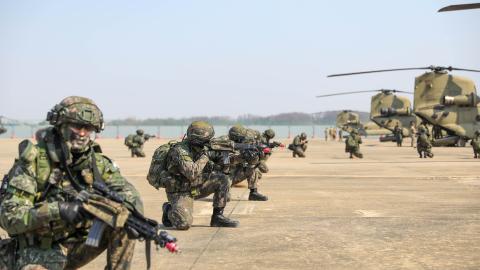Every spring, senior defense officials testify before the U.S. Congress about regional security. This year's "posture statements" by two top uniformed officers and one respected civilian showcase an increasingly dangerous defense environment.
China, Russia, and North Korea "are taking unprecedented actions that challenge international norms and advance authoritarianism," testified Admiral John Aquilino, Commander of the U.S. Indo-Pacific Command. "Without a credible deterrent," he added, "revisionist powers will be emboldened to take action to counter U.S. interests."
The posture statement of the outgoing commander of USINDOPACOM is a final plea to American lawmakers to remain resolute in the face of mounting threats to the rules-based international order.
In the past three years, China's PLA has added 400 advanced fighters, built 20 major warships, and doubled its arsenal of ballistic and cruise missiles. If Xi Jinping aims to achieve China's "great rejuvenation," Vladimir Putin's "blind ambition" is to "reclaim the clout" of the Soviet Union. Xi's determination to unify Taiwan with the Mainland could provoke conflict in Asia, and Putin's "illegal invasion of Ukraine" has catalyzed a Moscow-Pyongyang partnership centered on defense technology and sanctions-busting at the United Nations Security Council.
General Paul LaCamera, who commands U.S. Forces Korea and both the Combined Forces and United Nations Commands, underscored the "aggressive investment in information warfare" by all of three potential adversaries. Dr. Ely Ratner, Assistant Secretary of Defense for Indo-Pacific Security Affairs, implied that the third year of Russia's war in Ukraine has given impetus to China's "coercive and risky" military activities, which have, in turn, reinforced North Korea's persistent threat of "destabilizing behavior."
Most worrisome is the strategic intent of North Korea, which Admiral Aquilino believes is determined to field "a credible strategic deterrent." Kim Jong Un is focused on "preemptive and retaliatory precision nuclear strike capabilities," "developing tactical nuclear weapons," and "fielding a military reconnaissance satellite."
These are sobering security developments, not business as usual. Fortunately, all three officials can point to an impressive roster of steps to strengthen America's regional posture in tandem with South Korea and other allies and partners. Any doubts about U.S. staying power and reliability remain questions about the future, not the Biden administration's tenure in office.
As President Yoon Suk-yeol has seized the mantle of a “global pivotal state” and stood up to North Korean provocations, Washington has finally implemented the unfinished promise of President Barack Obama's "pivot" to Asia.
Admiral Aquilino could point to a more distributed regional force, with the United States balancing a robust presence in Northeast Asia with greater access to Southeast Asia, Guam, and Australia. Meanwhile, advanced warfighting capabilities and a hyper-campaign of joint and combined operations are reinforcing an enhanced network of allies and partners. The United States and South Korea have embarked on a new process for strengthening extended deterrence. At the same time, the U.S., South Korea, and Japan are activating "24/7 real-time DPRK missile warning data sharing."
In repeating the mantra about the U.S.-South Korean alliance as a "linchpin" or regional security, General LaCamera told Congress that current forward-based troop levels in Korea and Japan underwrite America's "ironclad commitment" and protect vital U.S. strategic interests. "It is better to be prepared from within Korea than to fight our way in," argued General LaCamera.
Consequently, South Korean-U.S. relations are reaching new heights. From the Washington Declaration and Nuclear Consultative Group to the Next Generation Critical and Emerging Technologies Dialogue, we are witnessing a period of profound and broad bilateral strategic alignment. Reflecting South Korea's global ambitions, these achievements are increasingly being felt in multilateral forums, from the trilateral Camp David Summit to the G-7-plus and G-20 meetings, NATO, and the recently completed third Summit for Democracy.
Yet populist politics could jeopardize this progress. A vocal minority of Americans labor under the illusion that the United States would be safer by withdrawing from global engagement and spending less on national security.
The world is riven with tensions and dangers continue to multiply. Seoul and Washington have fashioned credible responses, but they could be tripped up by corrosive domestic politics or a sudden lack of international consensus. Having staked so much on the success of ROK-U.S. relations, the risk of strategic misalignment or under-investing in its essential maintenance in the years ahead would have enormous consequences for both countries and the world.
The danger of a successful alliance is that if war is held at bay and peace prevails, some will argue that national security investments are unnecessary. As the Korean aphorism has it, even monkeys fall from trees. In short, a thriving alliance does not guarantee that democratic societies will remain steadfast—even in the face of myriad dangers.
This article originally appeared in Korean in the Dong-a Ilbo.


















